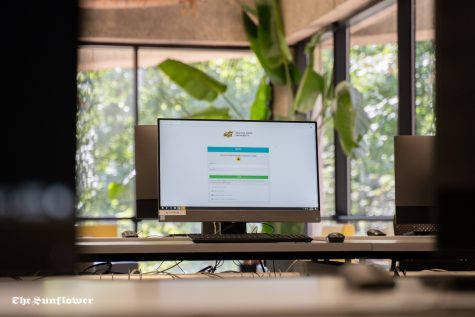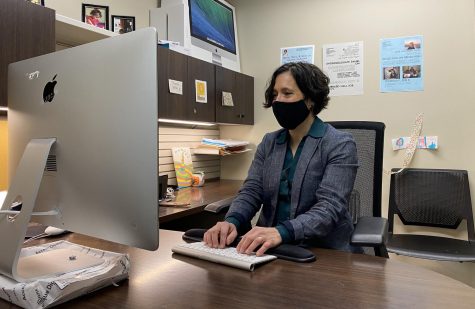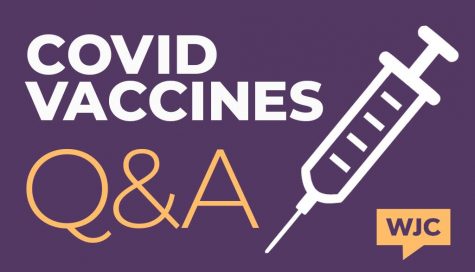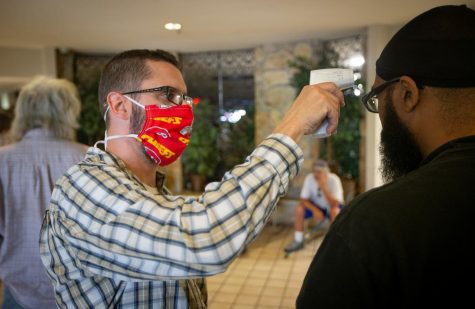One year later, Schlenker weighs in on accessibility
Emily Schlenker.
A year after her civil rights claim prompted Wichita State to appoint an accessibility coordinator and promise to make university resources more accessible to the visually impaired, Emily Schlenker, a blind pre-med student, said WSU should still be doing more in the realm of accessibility.
“Yes, things are getting better, but in a lot of ways, the system is still broken,” Schlenker said.
Schlenker said she is encouraged that the Student Government Association is striving to become more accessible to deaf students, but that they should not stop livestreaming weekly senate meetings.
“I’m not saying they shouldn’t try to fix it,” Schlenker said. “They should be streaming the meetings and trying to fix it.”
Schlenker said one solution would be to implement a program called A la CARTe, which allows for real-time captioning.
She first noticed the program being implemented at a national chemistry lecture she attended.
“This lady, I was at a big lecture and she was running this thing on her computer and the deaf students were totally engaged,” Schlenker said. “It was awesome.”
Schlenker, who is enrolled in two classes this semester, said she has had two very different experiences with the university’s preparedness to accommodate her needs.
She said her biology course and lab has been extremely adaptable.
“They were so prepared to have a blind student based on their own effort and their own research,” Schlenker said. “I can go in there and all my solution bottles are Brailled. I mean, I can’t give enough kudos to those guys.
“They were not told what to do. They went out and made the effort because they cared about me and they wanted me in their class.”
She said her organic chemistry course has not been nearly as accommodating.
“One of the reasons I signed up in April for an autumn class is to give the Office of Disability Services the time that they needed to actually get the materials prepared,” Schlenker said. “And I was still about a month behind up until now in that class.”
She said Brailling did not begin for her organic chemistry class until August.
Schlenker said it usually requires a crisis for the university to take action.
“I see more like, ‘Well, we think we’re prepared. Emily’s going to take a class. Oh no, what’s going on? Why doesn’t she have her materials?’” Schlenker said.
She said WSU needs to understand that the agreement to become more accessible is binding, not optional.
“In some ways, I don’t feel sorry for WSU because there are other universities that make all of these access issues work.”
———
Note: An earlier edition of this story read, “Schlenker, who is enrolled in two classes this semester, said she has had two very different experiences with professors’ preparedness to accommodate her needs.” Schlenker reached out to The Sunflower and said her organic chemistry professor “has made tremendous strides toward making a class he teaches via chalkboard a course where I am thriving in the lectures.”

Matthew Kelly is a former editor-in-chief and managing editor for The Sunflower. Kelly graduated in 2020 with a bachelor’s degree in political science...



















Emily Schlenker • Oct 3, 2017 at 2:16 pm
Thank you so much for making these changes. Feel free to delete my other comment, as I cannot seem to do it on my iPhone.
Emily Schlenker • Oct 3, 2017 at 12:50 pm
I am the subject of the story, and I’m going to take serious issue with part of it. My lack of braille and problems with my organic chemistry class are not the fault of the professor or the department. They are the fault of the disability services department, whose job it is to provide braille to and other accommodations students in a timely manner. I was enrolled in organic chemistry as of April 7 of this year, yet there were no homework documents requested by that office and hence No braille homework was produced, and I have been struggling very hard in that course. My professor has made great strides in working to describe the structures that he is drawing on the blackboard in order to teach the subject. I am thriving and learning while in lecture, but I cannot be expected to succeed when my lack of homework puts me at a disadvantage. Matthew, this was poorly done, and if you wanted to know more about this particular problem, you should’ve asked me before writing what you did. I will never be silent about access issues on campus, but I also do not appreciate being poorly or incorrectly represented after speaking with somebody directly.